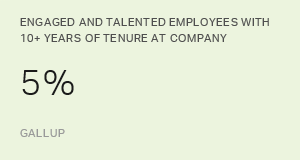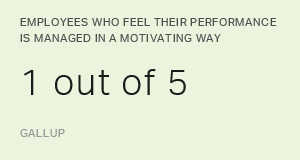Story Highlights
- Descriptive data alone do not equip HR leaders for success
- The right analytics ensure HR decisions drive organizational goals
- HR leaders need to become world-class people performance experts
You have plenty of trended data on employee performance. You have a cutting-edge dashboard and seamless reporting capabilities. This makes you data-driven, right?
Not quite.
Optimizing your decision-making requires more than retrospective analyses. It takes shifting from knowing how long employees have worked for the company to forecasting the likelihood that they will stay and identifying the criteria that most influence their retention. It takes building the capability to identify and quantify hidden patterns in the data that yield prescriptive recommendations.
To be data-driven, HR leaders need predictive, forward-looking insights from both their internal and external partners. They also need rigorous analyses that transform descriptive data to account for different factors. They need the right analytics.
This is especially true if HR leaders want to find themselves among the ranks of strategic decision-makers. With the right analytics, leaders can ensure that HR decision-making not only aligns with big-picture organizational goals, but also drives those goals.
Here are four ways that HR leaders can look beyond descriptive data to create a culture that is actually data-driven.
1. You need to link HR initiatives to business outcomes.
Knowing that 60% of employees have improved their internal customer satisfaction scores since last year does not tell you what drove the improvement or whether a certain performance initiative was effective and worth the investment.
Descriptive data alone do not equip HR leaders to draw hard-and-fast conclusions or establish the best course of action.
Worse, descriptive data can sometimes mislead HR leaders. Unaccounted-for variables -- especially coupled with the inherent biases of decision-makers -- can conceal the stories behind the numbers. As a result, leaders can easily deduce incorrect drivers for issues or apply faulty interventions to deal with them.
For example, an HR department that implements analytics-based hiring for midlevel managers might not see substantial improvements in team performance within the first six months of the initiative. However, these HR leaders could discover with rigorous statistical analyses and forecasting that the intervention is positioned to not only increase employee performance, but also fortify employee-manager relationships.
2. You need to be hypothesis-driven.
Many well-intentioned HR leaders determine which metrics and analyses matter by simply referencing the standard reports that come with their licensed reporting platform.
This narrow focus dramatically limits the usefulness of HR data. Rather than running the standard analyses at their fingertips, HR leaders should step back and ask themselves, "What are the major questions I need to answer? What pressing problems do I need to address?" The answers to such questions should determine which analyses HR leaders run.
Put another way, HR leaders need to be hypothesis-driven. They need to pinpoint their problems first, generate hypotheses about the potential causes of those problems and then run the appropriate analyses. This strategic investment up front will pay dividends in the long run, as leaders find themselves with powerful predictive insights that solve specific business problems and promote business goals.
3. You need comprehensive data from internal and external sources.
Internal data are comfortable and familiar -- they're convenient to access, simple to decipher and easy to control.
But in a data-driven world, relying on internal data alone is akin to boxing with one arm tied behind your back.
Rich insights from external data sources can inform decision-making and shed light on how effective HR initiatives are. For example, HR leaders can gauge the potential risk of turnover spikes at certain city centers based on the local unemployment rates or the prevalence of job postings for competing positions.
To gain outcome-driving insights from external data, HR leaders should build relationships with industry-leading data organizations that have analytics expertise and access to relevant data sets. The right partners can help you isolate questions and hypotheses and then review all relevant data -- from broader market data to local population statistics -- to run tailored analyses that can answer the most critical questions.
4. You need to be a world-class expert in people performance.
In Gallup's experience, many business leaders don't trust HR leaders in strategy discussions when those HR leaders have perspectives rooted in experience, rather than hard data and analyses. HR leaders should be authorities on what empirically drives human capital excellence and ROI -- and, how to reliably measure and predict those drivers.
That is, HR leaders are responsible for boosting the employee experience, maximizing human capital ROI, forecasting employee outcomes and quantitatively connecting HR initiatives to leaders' broader business goals. HR leaders need to be go-to authorities on all things related to people and performance in an organization.
They should be the guides for what people need to know, which analyses standards deliver robust answers, and how best to communicate those findings and integrate them into all aspects of the business.
To position themselves this way, HR leaders must focus on selecting research and data experts that can elevate their prominence and boost their reputation as people experts.
Becoming data-driven might seem daunting at first, and there's no doubt that building the necessary expertise takes time and effort. Still, HR leaders who want to have a greater say on strategic matters within their organizations will be rewarded for their investment.
Learn more about how Gallup helps HR leaders become critical partners in cultural change.
- Inquire about our workforce analytics solutions that connect HR data with growth and performance.
- Achieve sustainable change through our comprehensive culture solutions aimed at alignment and transformation.
- Download our State of the American Workplace report to gain an in-depth perspective on what matters most to employees in a role and company.
Bailey Nelson contributed to this article.


